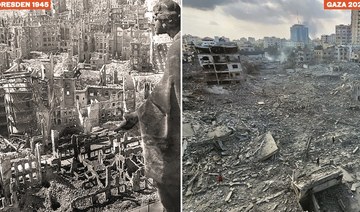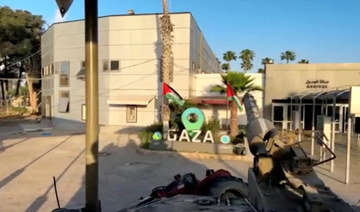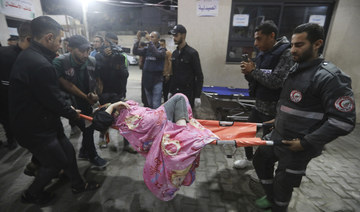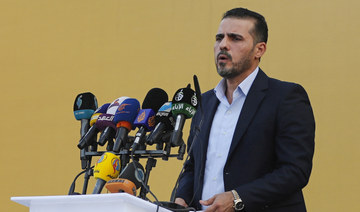DUBAI: Dubai’s state airport operator expects a “surge” in passenger traffic over the coming weeks and months, its chief executive said on Wednesday, after the United Arab Emirates announced an easing of travel restrictions from African and Asian countries.
The Gulf state, a major international travel hub, on Tuesday said it would scrap on Aug. 5 a transit flight ban which Emirates airline later said applied to passengers traveling from 12 countries, including major market India.
The UAE will also lift this week an entry ban on those who had visited India, Pakistan, Sri Lanka, Nepal, Nigeria or Uganda over the past 14 days for those with valid residencies and who are certified by Emirati authorities as fully vaccinated.
Dubai Airports Chief Executive Paul Griffiths said Dubai International was “ready to accommodate the anticipated surge in the coming weeks and months” once restrictions ease.
The Indian subcontinent is traditionally the largest source market for Dubai International, which is one of the world’s busiest airports and the hub for state airline Emirates.
Griffiths said the easing of entry restrictions on inbound travelers from South Asia as well as Nigeria and Uganda would allow for thousands of UAE residents to return.
“It’s a great development from both a social and economic standpoint,” he said.
Those traveling to the UAE or transiting through its airports need to meet various conditions including presenting a negative polymerase chain reaction (PCR) coronavirus test prior to departure.
Dubai International Airport is targeting 8 percent growth in passenger traffic this year to 28 million. It handled 86.4 million in 2019, the year before the pandemic struck.
Dubai airport expects passenger surge as UAE eases travel curbs
https://arab.news/6dbr5
Dubai airport expects passenger surge as UAE eases travel curbs
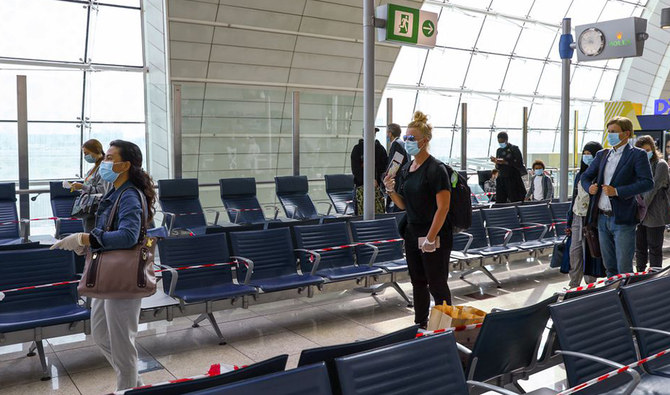
- UAE has lifted a ban on transit flights from India, Pakistan, other countries from August 5
- Dubai International Airport is targeting 8 percent growth in passenger traffic this year to 28 million
Riyadh Season extends partnership with UFC
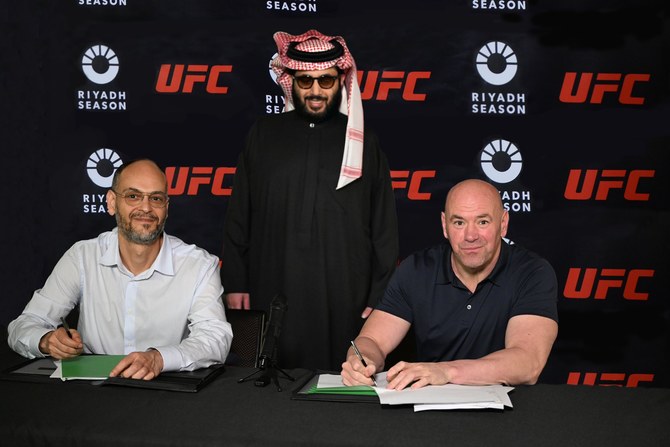
- Riyadh Season will also be a sponsor for UFC 306
RIYADH: Riyadh Season has signed a strategic agreement to extend a partnership with the UFC, Saudi Arabia’s entertainment authority chief announced on Tuesday.
The agreement ensures another UFC event in the Kingdom during the 2024-2025 Riyadh Season.
Riyadh will also host, for the first time, the Power Slap event, the world’s top slap fighting competition.
It was also announced that Riyadh Season will be a sponsor for UFC 306 on Sept. 14, 2024, to be held in Las Vegas.
“This agreement is a continuation of Riyadh Season’s aims to host and partner with prominent and international events of mass interest,” said Turki Alalshikh. “UFC is the most prominent Mixed Martial Arts organization in the world and their platform of global fans is unrivalled.”
Kingdom Arena in Riyadh will host the first Saudi UFC event on June 22 as middleweight contenders Robert Whittaker and Khamzat Chimaev battle in a highly anticipated matchup.
Riyadh Season will host the heavyweight boxing clash between Tyson Fury and Oleksandr Usyk on May 18. Fury withdrew from the bout that was scheduled for February due to a cut during sparring. But the showdown is back on and has the boxing world enthralled.
Riyadh Season is an annual festival held in the Saudi capital, during the cooler months of the year, bringing together globally enticing entertainment, cultural and sporting events.
US paused bomb shipment to Israel to signal concerns over Rafah invasion, official says
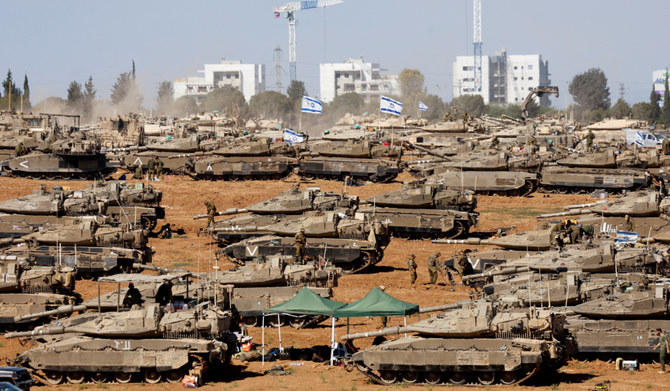
- Israel has killed more than 34,700 Palestinians in Gaza, mostly women and children, according to the health ministry in the Hamas-run territory
- The State Department is separately considering whether to approve the continued transfer of Joint Direct Attack Munition kits, which place precision guidance systems onto bombs, to Israel, but the review didn’t pertain to imminent shipments
WASHINGTON: The US paused a shipment of bombs to Israel last week over concerns that Israel was approaching a decision on launching a full-scale assault on the southern Gaza city of Rafah against the wishes of the US, a senior administration official said Tuesday.
The shipment was supposed to consist of 1,800 2,000-pound bombs and 1,700 500-pound bombs, according to the official, who spoke on the condition of anonymity to discuss the sensitive matter, with the focus of US concern being the larger explosives and how they could be used in a dense urban setting. More than 1 million civilians are sheltering in Rafah after evacuating other parts of Gaza amid Israel’s war on Hamas, which came after the militant group’s deadly attack on Israel on Oct. 7.
President Joe Biden’s administration in April began reviewing future transfers of military assistance to Israel as Prime Minister Benjamin Netanyahu’s government appeared to move closer toward an invasion of Rafah, despite months of opposition from the White House. The official said the decision to pause the shipment was made last week and no final decision had been made yet on whether to proceed with the shipment at a later date.
The State Department is separately considering whether to approve the continued transfer of Joint Direct Attack Munition kits, which place precision guidance systems onto bombs, to Israel, but the review didn’t pertain to imminent shipments.
Some colleges that had been permissive of pro-Palestinian protests begin taking a tougher stance
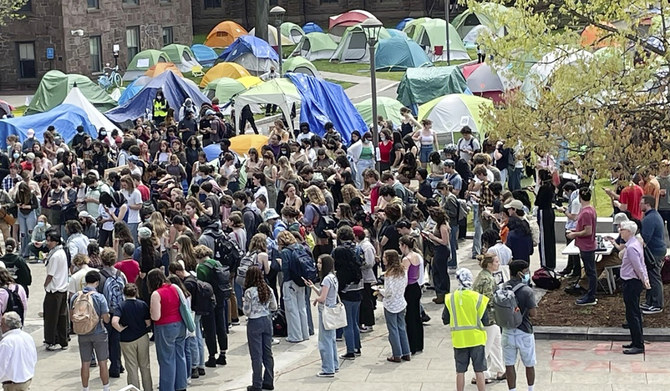
- Tensions have continued to ratchet up in standoffs with protesters on campuses across the US — and increasingly, in Europe — nearly three weeks into a movement launched by a protest at Columbia University
- Israel has killed more than 34,700 Palestinians in Gaza, mostly women and children, according to the health ministry in the Hamas-run territory
CHICAGO: Police cleared a pro-Palestinian tent encampment at the University of Chicago on Tuesday after administrators who had initially adopted a permissive approach said the protest had crossed a line and caused growing concerns about safety.
University President Paul Alivizatos acknowledged the school’s role as a protector of freedom of speech after officers in riot gear blocked access to the school’s Quad but also took an enough-is-enough stance.
“The university remains a place where dissenting voices have many avenues to express themselves, but we cannot enable an environment where the expression of some dominates and disrupts the healthy functioning of the community for the rest,” Alivizatos wrote in a message to the university community.
Tensions have continued to ratchet up in standoffs with protesters on campuses across the US — and increasingly, in Europe — nearly three weeks into a movement launched by a protest at Columbia University. Some colleges cracked down immediately on protests against the Israel-Hamas war. Among those that have tolerated the tent encampments, some have begun to lose patience and call in police over concerns about disruptions to campus life, safety and the involvement of nonstudents.
Since April 18, just over 2,600 people have been arrested on 50 campuses, figures based on AP reporting and statements from universities and law enforcement agencies.
But not all schools are taking that approach, with some letting protesters hold rallies and organize their encampments as they see fit.
The president of Wesleyan University, a liberal arts school in Connecticut, has commended the on-campus demonstration — which includes a pro-Palestinian tent encampment — as an act of political expression. The camp there has grown from about 20 tents a week ago to more than 100.
“The protesters’ cause is important — bringing attention to the killing of innocent people,” university President Michael Roth wrote to the campus community Thursday. “And we continue to make space for them to do so, as long as that space is not disruptive to campus operations.”
The Rhode Island School of Design, where students started occupying a building Monday, affirms students’ rights to freedom of speech and peaceful assembly and supports all members of the community, a spokesperson said. The school said President Crystal Williams spent more than five hours with the protesters that evening discussing their demands.
On Tuesday the school announced it was relocating classes that were scheduled to take place in the building. It was covered with posters reading “Free Palestine” and “Let Gaza Live,” and dove was drawn in colored chalk on the sidewalk.
Campuses have tried tactics from appeasement to threats of disciplinary action to resolve the protests and clear the way for commencements.
At the University of Chicago, hundreds of protesters gathered for at least eight days until administrators warned them Friday to leave or face removal. On Tuesday, law enforcement dismantled the encampment.
Officers later picked up a barricade erected to keep protesters out of the Quad and moved it toward the demonstrators, some of whom chanted, “Up, up with liberation. Down, down with occupation!” Police and protesters pushed back and forth along the barricade as the officers moved to reestablish control.
Officials at the University of North Carolina, Chapel Hill, told deans and department chairs Monday that some students have been informed by instructors opposing the suspension of student protesters that they will withhold grades.
The school provost’s office said it will support “sanctions for any instructor who is found to have improperly withheld grades.”
At the Massachusetts Institute of Technology, protesters were given a deadline to voluntarily leave or face suspension. Many left, according to an MIT spokesperson, who said protesters breached fencing after the arrival of demonstrators from outside the university. On Monday night, dozens remained at the encampment in a calmer atmosphere.
MIT officials said the following day that dozens of interim suspensions and discipline committee referrals were in process, actions taken to ensure the “safety of our community.”
Sam Ihns, a graduate student studying mechanical engineering and a member of MIT Jews for a Ceasefire, said the group has been there for two weeks and is calling for an end to the killing in Gaza.
“Specifically, our encampment is protesting MIT’s direct research ties to the Israeli Ministry of Defense,” he said.
Many protesters want schools to divest from companies that do business with Israel or otherwise contribute to the war effort. Others simply want to call attention to the deaths in Gaza and for the war to end.
Wesleyan senior Uday Narayanan said students there are prepared to protest through the summer if that’s what it takes for their demands to be met.
“Our tuition dollars are still going toward the brutalization of Palestinians,” the 21-year-old physics major said. “So, ultimately, even though our president has said, ‘Oh, I’m not going to call the cops. Oh, I’m not going to beat up students,’ that’s still not enough, and that’s not the bare minimum for us.”
And as Wesleyan’s May 26 commencement approaches, some protesters fear they will be forcibly removed from the center of campus, adjacent to the field where the ceremony is to take place.
“The longer we are here, the more that their facade of laid back, hands off is falling away,” said Batya Kline, a 22-year-old graduate student. “We know that the university does not want us here, and we know that they can change their pace at the drop of a hat without letting us know.”
Frank Straub, senior director of violence prevention at nonprofit advocacy organization Safe and Sound Schools, said these and past protests have shown the need for early dialogue among the university, police and protesters to establish ground rules.
Straub said Wesleyan, for example, needs to have conversations about commencement and where protesters can be, and should make sure a plan is in place to respond, should protesters want to get arrested, so that can be done without violence.
“By their nature, protests are adversarial, but I think we can have controlled adversity,” he added. “And I think the more campus officials are engaged with the protesters and the more police are included in those conversations, that’s critically important.”
The protests stem from the conflict that started Oct. 7 when Hamas militants attacked southern Israel, killing about 1,200 people, mostly civilians, and taking roughly 250 hostages.
Vowing to destroy Hamas, Israel launched an offensive in Gaza that has killed more than 34,500 Palestinians, about two-thirds of them women and children, according to the Health Ministry in the Hamas-ruled territory. Israeli strikes have devastated the enclave and displaced most of its inhabitants.
Hospital reports 7 killed, several wounded by Israeli strike in Gaza City
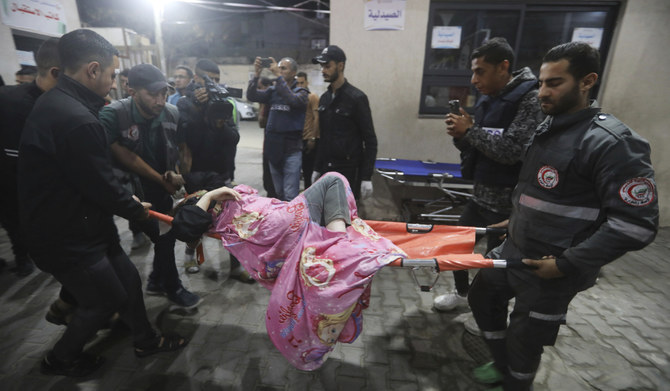
GAZA CITY: An Israeli air strike killed at least seven people and wounded several others early Wednesday in Gaza City, according to a local hospital.
The strike on an apartment in the devastated northern city killed seven members of the same family, the Al-Ahli hospital said, with eyewitnesses on Wednesday also reporting strikes elsewhere in the strip, particularly around Rafah.
Scenes from Israel and Gaza reflect dashed hopes as imminent ceasefire seems unlikely
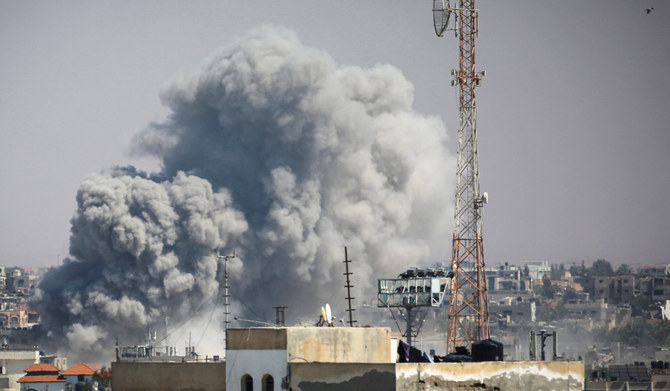
- Israel has killed more than 34,700 Palestinians, according to Gaza’s Health Ministry
- Hundreds of thousands in Gaza have been displaced, many sheltering in nylon tents in Gaza’s south, as “a full-blown famine” develops in the north of the enclave, according to the United Nations
JERUSALEM: An announcement by Hamas late Monday that it had accepted a ceasefire proposal sent people in the streets of Rafah into temporary jubilation, as Palestinian evacuees in the jam-packed town felt their first glimmer of hope the war could end.
For families of Israeli hostages held in Gaza, the announcement raised the possibility that their long wait was coming to an end — that they might soon see their loved ones.
But the fervor was short-lived.
A few hours after Hamas’ announcement, Israel rejected the proposal — which was different from one the two sides had been discussing for days — and said it was sending a team of negotiators for a new round of talks.
By Tuesday morning, Israeli tanks had rolled into Rafah, cementing the dashed hopes among Israelis and Palestinians of any imminent ceasefire.
In Rafah, disillusioned Palestinians spent Tuesday packing up their belongings and preparing to evacuate.
Families of Israeli hostages were incensed, too, and thousands of protesters demonstrated late into the night across the country.
GAZA: PALESTINIANS EVACUATE, CONDEMN COLLAPSE OF DEAL
Across Gaza, Palestinians have been demanding a ceasefire for months, hoping that a stop to the fighting will bring an end to the suffering.
Over 34,000 Palestinians in Gaza have been killed by Israeli fire and airstrikes since the war erupted on Oct. 7., according to the Hamas-run Health Ministry. That day, Hamas militants killed about 1,200 in Israel and took around 250 hostages.
An estimated 100 hostages and the remains of 30 others are still held by Hamas, which insists it will not release them unless Israel ends the war and withdraws from Gaza.
Hundreds of thousands in Gaza have been displaced, many sheltering in nylon tents in Gaza’s south, as “a full-blown famine” develops in the north of the enclave, according to the United Nations.
So when the news came out that Hamas had accepted a ceasefire proposal put forward by Egypt and Qatar, Palestinians poured onto the streets, carrying children on their shoulders and banging pots and pans in excitement. For a moment, it seemed life would get easier.
But in the early hours of Tuesday, Israeli tanks entered the edge of Rafah and took control of one of the key border crossings between Israel and Gaza. Palestinians in the city loaded their belongings onto large trucks and fled.
“They kept giving us hope and telling us tomorrow, or after tomorrow, a truce will take place,” said Najwa Al-Siksik as drones buzzed over her tent camp. “As you can hear,” she said, “this was happening all night long.”
El-Sisik said she had lost all hope of an eventual deal.
“(Israel) doesn’t care about us or our children,” she said. “It only cares about its people. And (Prime Minister Benjamin) Netanyahu only cares about being at the top.”
Raef Abou Labde, who fled to Rafah from the southern Gaza city of Khan Younis earlier in the war, rode atop a car packed with belongings, headed to what was sure to be yet another temporary refuge. Labde said he had little faith that Netanyahu’s far-right government sincerely wanted a ceasefire deal.
“I hope to God that the truce happens,” he said. “But what I see is that Netanyahu doesn’t want a ceasefire. He wants to displace the Palestinian people to Sinai, destroy Gaza and occupy it.”
ISRAEL: PROTESTS GROW, DEMANDING NEW DEAL NOW
In Israel, the Hamas announcement did not provoke the kind of immediate celebrations seen in Gaza. Many relatives of hostages held in Gaza, who have seen what feels like countless rounds of ceasefire negotiations end with no deal, have grown jaded.
“We won’t believe there’s a deal until we start to see some hostages return home,” said Michael Levy, whose 33-year-old brother, Or Levy, remains in captivity.
Still, the back and forth between Israel and Hamas led to boisterous and sustained protests Monday night. Protesters, led by hostage families, blocked the main highway into Tel Aviv, lighting fires on the road.
Demonstrations also broke out in Jerusalem, Haifa, and Beersheba.
Hostage families slammed the government’s inaction on a possible deal in a hearing at Israel’s parliament Tuesday.
“We see all sorts of explanations — this isn’t the deal that we gave them, Hamas changed it,” said Rotem Cooper, whose father Amiram Cooper was kidnapped Oct. 7. He questioned whether military pressure was an effective bargaining tactic to force Hamas to release additional hostages.
For some, the news indicated that a deal was closer than ever before.
Sharone Lifshitz, whose father, Oded, is a hostage, said she believed the differences between the proposal Hamas had accepted and Israel’s “core demands” were not so wide.
“Hamas are shrewd operators,” she said. “Now it’s going to be hard for Israel to just say ‘no.’”
Others said they hoped Israel’s movement into Rafah Tuesday was a tactic to pressure Hamas into a mutually agreeable deal.
“This is a way to show that Israel is serious about its demands,” said Levy. “Hamas can’t just declare they have agreed to a deal with changed terms.”






